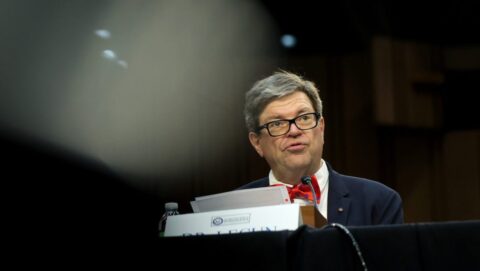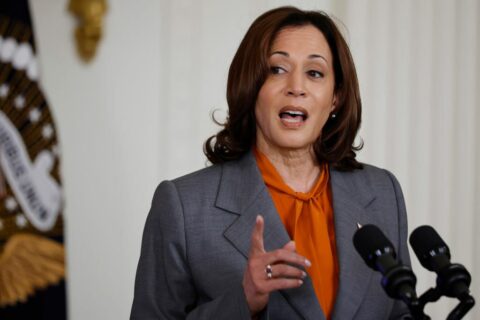Many leading AI companies issued statements in response to President Biden’s executive order, but OpenAI has yet to say anything.

In the wake of President Biden’s executive order on Monday, AI companies and industry leaders have weighed in on this watershed moment in AI regulation. But the biggest player in the AI space, OpenAI, has been conspicuously quiet.
The Biden-Harris administration’s far-ranging executive order addressing the risks of AI builds upon voluntary commitments secured by 15 leading AI companies. OpenAI was among the first batch of companies to promise the White House safe, secure, and trustworthy development of its AI tools. Yet the company hasn’t issued any statement on its website or X (formerly known as Twitter). CEO Sam Altman, who regularly shares OpenAI news on X, hasn’t posted anything either.
OpenAI has not responded to Mashable’s request for comment.
Of the 15 companies that made a voluntary commitment to the Biden Administration, the following have made public statements, and all of which expressed support for the executive order: Adobe, Amazon, Anthropic, Google, IBM, Microsoft, Salesforce, and Scale AI. Nvidia decline to comment.
In addition to crickets from OpenAI, Mashable has yet to hear from Cohere, Inflection, Meta, Palantir, and Stability AI. But OpenAI and Altman’s publicity tour proclaiming the urgent risks of AI and the need for regulation makes the company’s silence all the more noticeable.
Altman has been vocal about the threat that generative AI made by his own company poses. In May, Altman, along with technology pioneers Geoffrey Hinton and Bill Gates signed an open letter, stating, “Mitigating the risk of extinction from AI should be a global priority alongside other societal-scale risks such as pandemics and nuclear war.”
At a senate hearing in May, Altman expressed the need for AI regulation: “I think if this technology goes wrong, it can go quite wrong, and we want to be vocal about that,” said Altman in response to inquiry from Sen. Blumenthal, D-CT about the threat of superhuman machine intelligence.
So far, cooperation with lawmakers and world leaders has worked in OpenAI’s favor. Altman participated in the Senate’s bipartisan closed-door AI summit, giving OpenAI a seat at the table for formulating AI legislation. Shortly after Altman’s testimony, leaked documents from OpenAI showed the company lobbying for weaker regulation in the European Union.
It’s unclear where OpenAI stands on the executive order, but open-source advocates say the company already has too much lobbying influence. On Wednesday, the same day as the AI Safety Summit in the U.K., more than 70 AI leaders issued a joint statement calling for a more transparent approach to AI regulation. “The idea that tight and proprietary control of foundational AI models is the only path to protecting us from society-scale harm is naive at best, dangerous at worst,” said the statement.
Meta Chief AI Scientist Yann LeCun, one of the signatories, doubled down on this sentiment on X (formerly known as Twitter) by calling out OpenAI, DeepMind (a subsidiary of Google), and Anthropic for using fear-mongering to ensure favorable outcomes. “[Sam] Altman, [Demis] Hassabis, and [Dario] Amodei are the ones doing massive corporate lobbying at the moment. They are the ones who are attempting to perform a regulatory capture of the AI industry,” he posted.
Anthropic and Google leadership have both provided statements supporting the executive order, leaving OpenAI the lone company accused of regulatory capture yet to issue any comment.
What could the executive order mean for OpenAI?
Many of the testing provisions in the EO relate to huge foundation models not yet on the market and future development of AI systems, suggesting consumer-facing tools like OpenAI’s ChatGPT won’t be impacted much.
“I don’t think we’re likely to see any immediate changes to any of the generative AI tools available to consumers,” said Jake Williams, former US National Security Agency (NSA) hacker and Faculty member at IANS Research. “OpenAI, Google, and others are definitely training foundation models and those are specifically called out in the EO if they might impact national security.”
So, whatever OpenAI is working on might be subjected to government testing.
In terms of how the executive order might impact directly OpenAI, Beth Simone Noveck, director of the Burnes Center for Social Change, said it could slow down the pace of new products and updates being released and companies will have to invest more in research and development and compliance.
“Companies developing large-scale language models (e.g. ChatGPT, Bard and those trained on billions of parameters of data) will be required to provide ongoing information to the federal government, including details of how they test their platforms,” said Noveck, who previously served as the first United States Deputy Chief Technology Officer under President Obama.
More than anything, the executive order signals an alignment with growing consumer expectations for greater control and protection of their personal data, said Avani Desai, CEO of Schellman, a top CPA firm that specializes in IT audit and cybersecurity.
“This is a huge win for privacy advocates as the transparency and data privacy measures can boost user confidence in AI-powered products and services,” Desai said.
So while the consequences of the executive order may not be immediate, it squarely applies to OpenAI’s tools and practices. You’d think OpenAI might have something to say about that.










